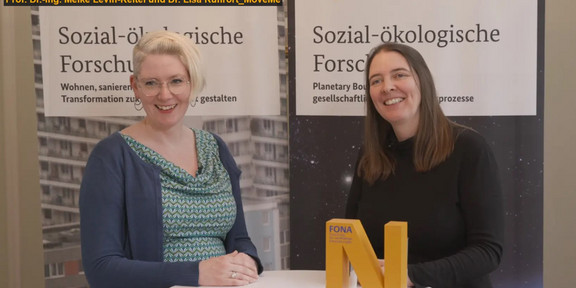We explore the socio-spatial perspective on transformation processes in the digital age.
FONA: Minds of the future

HELPING TO SHAPE THE WORLD
After a voluntary ecological year, it was clear to Meike Levin-Keitel that she wanted to continue working on socially relevant ecological issues. "Studying landscape and open space planning allowed me to further expand my knowledge from landscape architectural design to ecological planning and help shape the world of tomorrow." She began getting involved socially as a high school student. Levin-Keitel worked on ecological initiatives and associations, and later volunteered as the financial director of a schoolgirl's store. "I like to lend a hand when there's a need and people are needed who want to help shape things. I guess that's still the case today."
MOVEME
"Our research project MoveMe is about sustainable mobility behavior' that is, what moves me and how it moves me. From a socio-ecological perspective, we are interested in how the social change towards sustainable mobility behavior can go." Together with Dr. Lisa Ruhrort from the Social Science Research Center Berlin (WZB), she leads the MoveMe junior research group in social-ecological research. There, an inter- and transdisciplinary research process is investigating how a 'multi-optional' mobility culture can be implemented in different types of spaces. As a planning unit, this includes high-density inner-city areas as well as different types of suburban and rural spaces.
"We're working very closely with our practice partners to explore how we can implement transportation transformation in the region." The junior research group applies and develops understandings of space from spatial and transportation science, sociology, environmental psychology and transformational science in an interdisciplinary way. Specifically, MoveMe analyzes and evaluates the effects of selected key innovations of digitized mobility on transport and space for the development of sustainable mobility structures in three sample neighborhoods in the Hannover region.
"We always assume that we already know many measures. We know quite a lot of what we can do. The question is, what actually works where, in which space?"
WORK MUST BE FUN
"I only became friends with a career in science at a very late stage. It was and is always more important to me that I enjoy my work, that it challenges me and that I always find new challenges. In which field I then work - i.e., in the private sector, at the university or in public administration - only became relevant later with my research."
FAMILY AND WORK
Meike Levin-Keitel's children shape her work to a considerable extent. "This starts with the temporal and spatial organization of my work in terms of classic office hours versus joint family time as well as commuting between Dortmund and Hanover. And it extends to mobility issues, such as which mode of transport we want to use to go on vacation together, car or train."
To the video

![[Translate to English:] [Translate to English:]](/storages/rtd-raumplanung/_processed_/a/a/csm_pexels-anton-atanasov-391831_c476c2aa05.jpg)